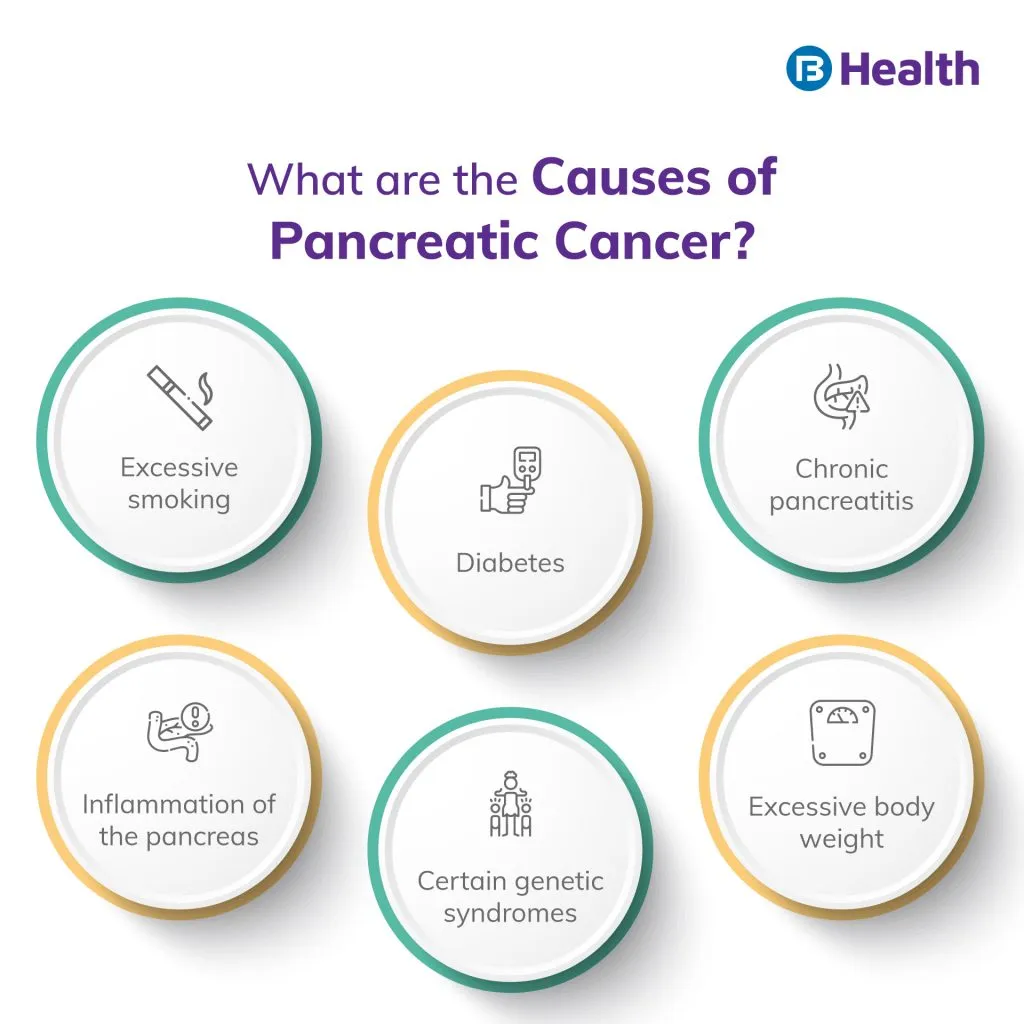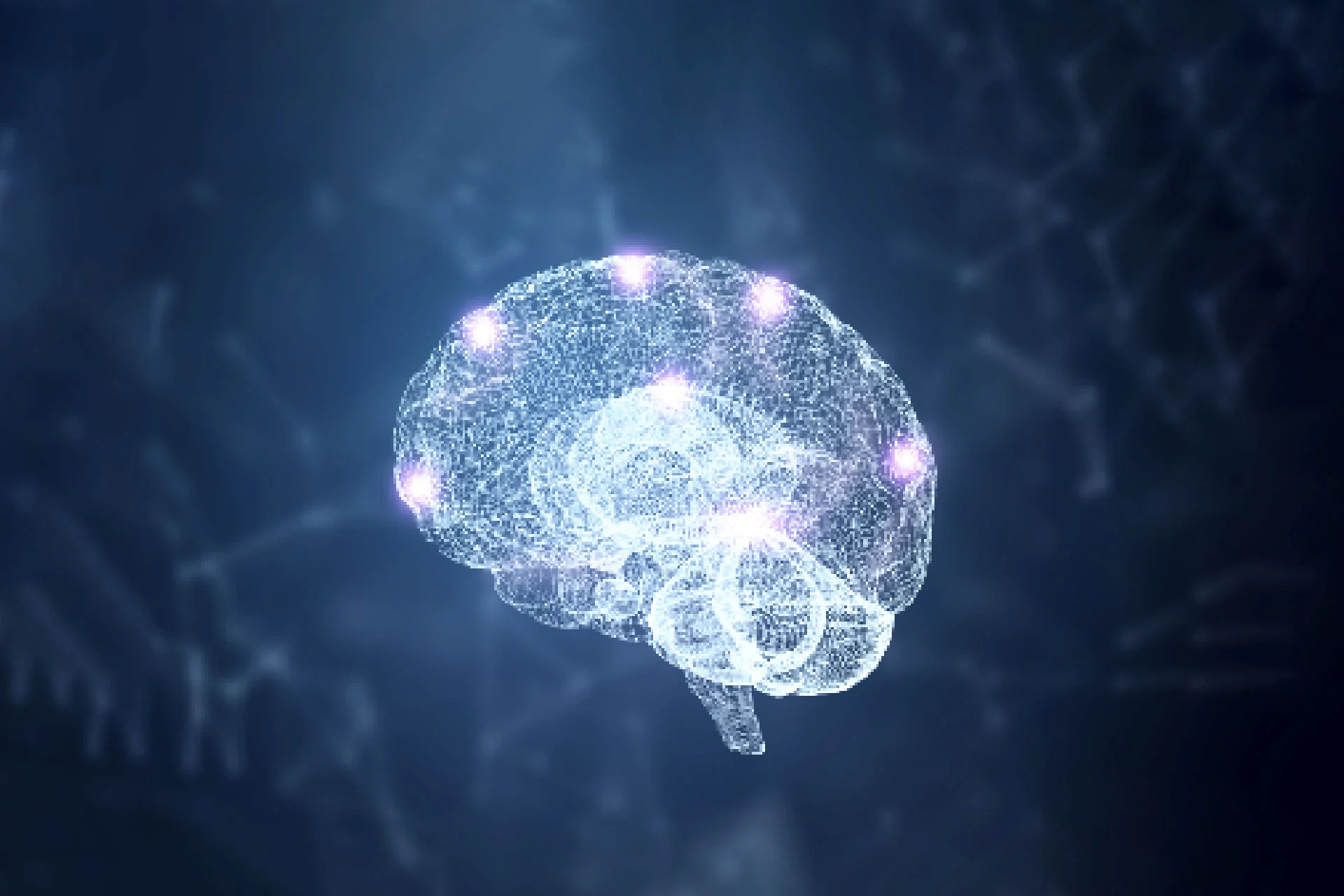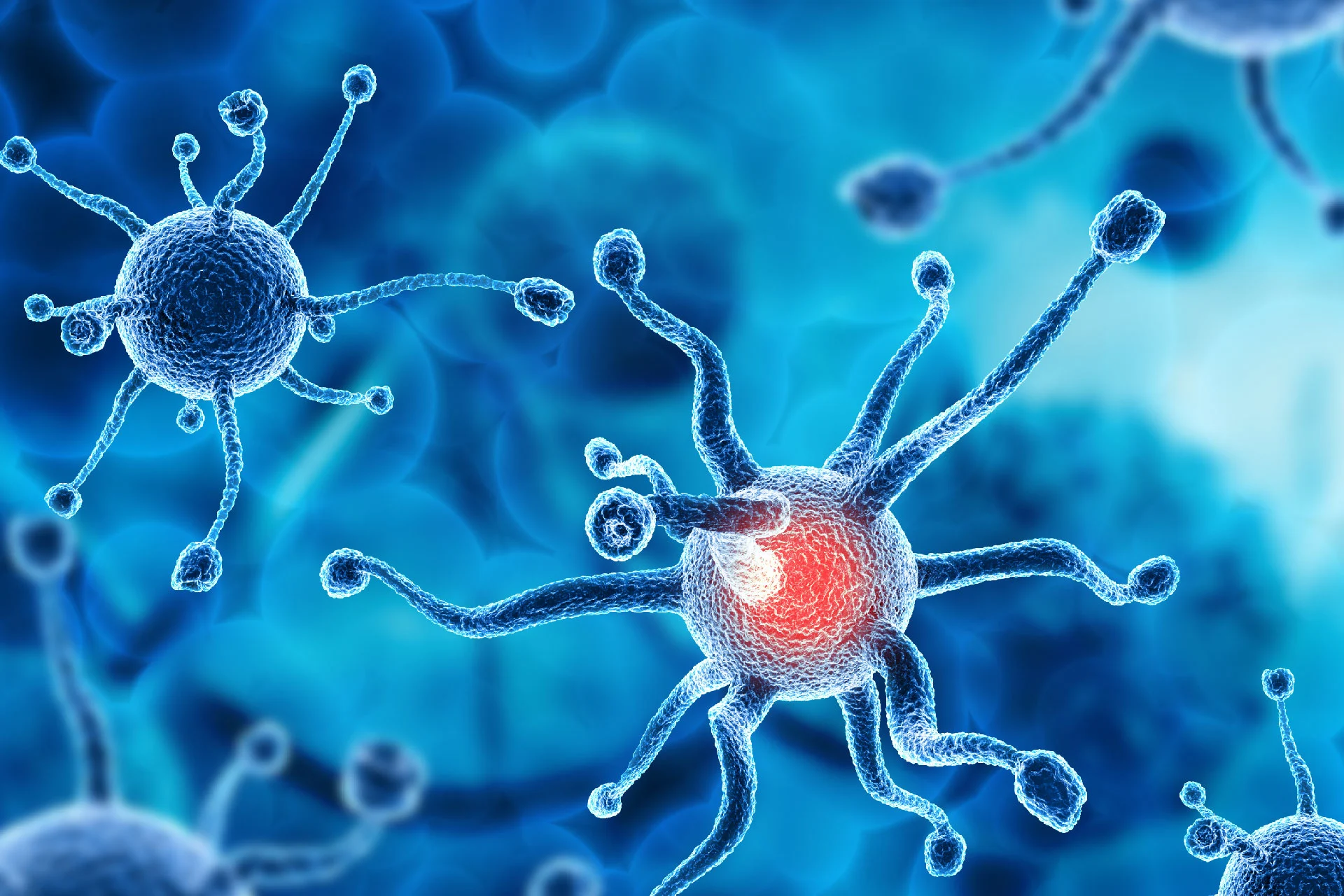Cancer | 8 min read
Pancreatic Cancer: What are the Signs and How to Treat It?
Medically reviewed by
Table of Content
Synopsis
Key Takeaways
- When uncontrolled cell growth occurs in a portion of the pancreas, pancreatic cancer develops
- Exocrine cells are where the bulk of pancreatic tumours begin
- Pancreatic cancer symptoms frequently don't show up until later stages
What is Pancreatic Cancer?
The pancreas is an organ located behind your stomach's bottom portion. It is where pancreatic cancer first develops. Your pancreas produces hormones that assist control of your blood sugar and enzymes that facilitate digestion.
The pancreas is prone to malignant and non-cancerous tumours, among other growths. However, the cells that line the ducts that remove digestive enzymes from the pancreas are the first to become the most prevalent kind of pancreatic cancer (pancreatic ductal adenocarcinoma).
Pancreatic Cancer Causes
It is uncertain what causes pancreatic cancer. It is unclear why abnormal cells start to proliferate and form tumours inside the pancreas, which results in the development of pancreatic cancer.Healthy cells often develop and die in moderate amounts. There is an increase in the generation of abnormal cells in the case of cancer. These cells eventually replace healthy cells in the body.
There is no known primary cause of pancreatic cancer, although some risk factors might increase your chances of acquiring it. These consist of the following:
Using tobacco
Smoking may be responsible for 20 to 25 percent of occurrences of this cancer [1].
Abundant alcohol use
Your risk may be increased if you consume three or more alcoholic beverages per day. Another risk factor for pancreatitis is alcohol use.
Chronic and hereditary pancreatitis
This refers to pancreatic inflammation. Heavy drinking over an extended period of time frequently leads to chronic pancreatitis. An inherited form of pancreatitis is possible.
Weight
Your risk may be increased if you are overweight or obese, especially in your early adult years.
Diet
Although the precise relationship between dietary variables and the chance of developing pancreatic cancer is yet unknown, eating a diet heavy in red and processed meats, fried foods, sweets, or cholesterol may raise your risk.
Sex
When it comes to this cancer, males are somewhat more likely than women to get it.

Pancreatic Cancer Other Causes
Up to 12% of pancreatic cancer cases may be caused by exposure to pesticides and certain chemicals at work, especially those used in metalworking [2]
Age
It is most frequently found in people between the ages of 65 and 74 [3]
Diabetes
Type 1 or type 2 diabetes may increase your chance of acquiring pancreatic cancer.
Ancestral history
Up to 10% of those who develop pancreatic cancer have a family history of the same disease [4]
Infections
Although the precise connection between H. pylori infection and pancreatic cancer is unclear, having a history of the illness in your digestive system may raise your risk. Additionally, having hepatitis B might raise your risk.
Pancreatic Cancer Symptoms
Pancreatic cancer symptoms do not usually appear until the disease has advanced. Additionally, they may resemble other illnesses' symptoms, making a diagnosis more difficult.
The following are some common symptoms
- Back or abdominal pain (most common symptom in females)
- Jaundice, which is common in people with this kind of cancer
- Loss of appetite and weight
- Liver or gallbladder swelling
- Diabetes
- Light grey or fatty faeces
- Vomiting and nausea
- Chills and, occasionally, a fever
- Fatigue
- Constipation or diarrhoea
- Indigestion
- Rash as a result of jaundice
In contrast to more typical pancreatic symptoms like jaundice or weight loss, pancreatic neuroendocrine cancer symptoms might differ. This is due to the hormone overproduction of certain PNETs.
Additional Read: Endometrial Cancer SymptomsPancreatic Cancer Treatment
Treatment for this cancer is based on several factors, including the location of the tumour, its stage, your overall health, and if the disease has progressed outside of the pancreas. Options for pancreatic treatment include
Surgical removal
The malignant portion of the pancreas is removed (resection). It is also possible to remove lymph nodes that are close to the pancreas. A pancreatectomy is the surgical removal of the pancreas or a portion of the pancreas. For example, your doctor can advise the Whipple operation if your tumour is in the pancreas's head, which is its broadest region and is closest to the small intestine. The duodenum, the small intestine’s first section, the gallbladder, a part of the bile duct, and lymph nodes are all removed as a part of this surgical procedure.
Radiation therapy
Cancer cells are killed with high-speed energy.
Chemotherapy
This treatment involves the use of chemicals that destroy cancer cells.
Immunotherapy
It is a therapy to support your body's fight against cancer. About 1% of patients with pancreatic cancer and a certain genetic change may benefit from immunotherapy, despite the fact that it has been mostly unsuccessful against pancreatic cancer.Targeted therapy
It aims to block cancer growth by targeting certain genes or proteins. Usually, genetic testing decides if targeted therapy is the best option for you.
Clinical trials
Discuss the possibility of enrolling in a clinical study with your healthcare practitioner.
Cancer insurance helps cover the cost of medical treatments related to Pancreatic Cancer. It may pay for expenses such as chemotherapy, radiation, surgery, and hospital stays. It can also cover the cost of transportation to and from treatments and loss of income due to time off work. Cancer insurance plan can provide financial support during a difficult and costly time.
Pancreatic Cancer Diagnosis
The cancer specialist may request a number of tests to identify the origin of your issue or the severity of the disease after reviewing your medical history, including
- A CT scan (computed tomography)
- MRI (magnetic resonance imaging)
- Endoscopic ultrasound (EUS)
- Laparoscopy
- Endoscopic retrograde cholangiopancreatography (ERCP)
- Percutaneous transhepatic cholangiography (PTC)
- Biopsies (removal of tissue to view it under a microscope)
Stages of Pancreatic Cancer
- There are five distinct stages. The extent of cancer's spread, the size and location of the tumour, and other factors all affect your diagnosis:
- Stage 0: Also referred to as carcinoma in situ, this stage is characterized by abnormal cells in the pancreatic lining. It's possible for the cells to become cancerous and spread to surrounding tissue
- Stage 1: In the pancreas, the tumour is present
- Stage 2: The pancreatic tumour has either spread to neighbouring lymph nodes, tissues, or organs
- Stage 3: Cancer has advanced to significant blood vessels close to the pancreas. Additionally, it can affect lymph nodes close by
- Stage 4: The disease has progressed to different body parts, such as the lungs, liver, or abdominal cavity, in stage 4 pancreatic cancer. Organs, tissues, or lymph nodes close to the pancreas may have been affected
Make sure to talk about your condition with your healthcare professional. Knowing your pancreatic cancer prognosis with doctor consultation will help you choose your therapy in a well-informed manner.
Pancreatic Cancer Complications
It can advance and lead to complications like:
Loss of weight
In persons with pancreatic cancer, a variety of conditions might lead to weight loss. As the body's energy is used up by the malignancy, weight loss might occur. Eating may be challenging if you have nausea and vomiting due to cancer therapies or a tumour pushing on your stomach. It is also possible that your pancreas isn't producing enough digestive fluids, which means your body is having trouble breaking down the nutrients from meals.
Jaundice
Jaundice can be caused by pancreatic cancer that restricts the bile duct of the liver. Yellow skin and eyes, darkish urine, and light-coloured faeces are some of the symptoms. Jaundice usually occurs in the absence of abdominal pain.
Pain
Your abdomen's nerves may become compressed if a tumour grows, resulting in serious discomfort. You could feel more at ease if you take painkillers. In addition, radiation and chemotherapy treatments might limit the tumour's growth and lessen some of the discomfort. In difficult situations, your doctor might suggest injecting alcohol into the nerves to regulate your abdominal discomfort (celiac plexus block). This technique prevents the nerves from communicating pain signals to your brain.
Bowel obstruction
The digested food’s movement from your stomach into your intestines can be restricted by pancreatic cancer that invades or pushes on the duodenum, the first segment of the small intestine. Your physician could advise putting a tube (stent) within your small intestine to keep it open. In certain circumstances, it could be beneficial to have surgery to insert a temporary feeding tube or connect your stomach to a lower area in your intestines that isn't obstructed by cancer.
Types of Pancreatic Cancer
It comes in several types. The primary difference is whether they impact the exocrine or endocrine glands.
Exocrine pancreatic cancer
Enzymes produced by the exocrine glands go to the intestines and aid in the breakdown of lipids, proteins, and carbs. Exocrine glands make up the vast majority of the pancreas.
The following type of cancer can have an impact on exocrine function
- Adenocarcinomas
- Acinar cell carcinomas
- Cystic tumours
The majority of pancreatic cancers impair exocrine activity.
Endocrine pancreatic cancer
The islets of Langerhans, which are condensed groups of cells, are the endocrine glands. They cause the bloodstream to produce the hormones glucagon and insulin. They assist in controlling blood sugar levels there. Diabetes can develop as a result of these glandular issues.
Get an oncologist consultation with experts on Bajaj Finserv Health as soon as possible if you're exhibiting symptoms that you believe might be related to pancreatic cancer, especially if you're at higher risk for the disease. Although many diseases might present overlapping symptoms, pancreatic cancer is best treated when discovered in the early stages. However, this is not always attainable because many patients do not exhibit symptoms until the later stages. So, if you have a history of pancreatic cancer in your family, think about seeing a genetic counsellor. To assess if you can benefit from a genetic test to understand better your risk of developing it or other malignancies, they may go over your family's medical history with you.
References
- https://www.mdpi.com/2077-0383/8/9/1427/htm
- https://www.ncbi.nlm.nih.gov/pmc/articles/PMC6394840/
- https://www.cancercenter.com/cancer-types/pancreatic-cancer/risk-factors
- https://www.hopkinsmedicine.org/health/conditions-and-diseases/pancreatic-cancer/pancreatic-cancer-risk-factors#:~:text=The%20American%20Cancer%20Society%20reports,more%20prone%20to%20this%20mutation.
Disclaimer
Please note that this article is solely meant for informational purposes and Bajaj Finserv Health Limited (“BFHL”) does not shoulder any responsibility of the views/advice/information expressed/given by the writer/reviewer/originator. This article should not be considered as a substitute for any medical advice, diagnosis or treatment. Always consult with your trusted physician/qualified healthcare professional to evaluate your medical condition. The above article has been reviewed by a qualified doctor and BFHL is not responsible for any damages for any information or services provided by any third party.





